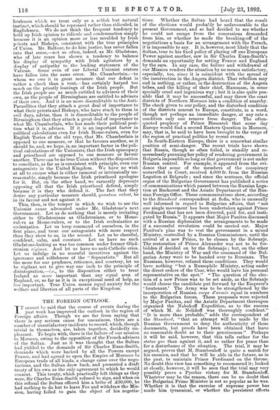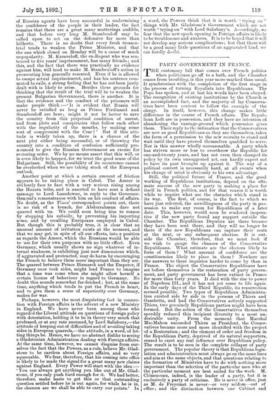THE FOREIGN OUTLOOK.
IT cannot be said that the course of events during the past week has improved the outlook in the region of Foreign affairs. Though we are far from saying that there is any serious cause for uneasiness, there are a number of unsatisfactory incidents to record, which, though trivial in themselves, are, taken together, decidedly un- pleasant. To begin with, there is the failure of our mission to Morocco, owing to the opposition of the French advisers of the Sultan. Just as it was thought that the Sultan had yielded to the demands of Sir Charles Euan-Smith, .demands which were backed by all the Powers except France, and had agreed to open the Empire of Morocco to European trade of all kinds, a change came over the nego- tiations, and the Sultan drew back, and presented a draft treaty of his own as the only agreement to which he would consent. This treaty, which practically left things as they were, Sir Charles Euan-Smith refused to sign, and when on this refusal the Sultan offered him a bribe of £30,000, he had nothing to do but to leave Fez and withdraw the Mis- sion, having failed to gain the object of his negotia- tions. Whether the Sultan had heard that the result of the elections would probably be unfavourable to the present Government, and so had decided to see whether he could not escape from the concessions demanded from him, or whether he made the breaking-off of the negotiations a basis for an arrangement with the French, it is impossible to say. It is, however, most likely that the Sultan, true to his fixed policy of playing off one European Power against another, saw in Sir Charles Euan-Smith's demands an opportunity for setting France and England by the ears. In any case, the failure and withdrawal of our Mission renders the situation by no means satisfactory, especially, too, since it is coincident with the spread of the insurrection in the Angera district. That rebellion may end in nothing, or rather, in the destruction of the Angers tribes, and the killing of their chief, Hammam, in some specially cruel and ingenious way ; but it is also quite pos- sible that it may be successful, and may throw the coast districts of Northern Morocco into a condition of anarchy. The check given to our policy, and the disturbed condition of the districts nearest to Europe, constitute, in a word, though not perhaps an immediate danger, at any rate a condition only one remove from danger. The often- quoted prophecy of Prince Bismarck that some day Europe would find a second Eastern Question in Morocco, may, that is, be said to have been brought to the verge of the region of practical politics by recent events. In South-Eastern Europe, there is a somewhat similar position of semi-danger. The recent trials have shown that Russia, though so often foiled, is steadily and re- morselessly pursuing her policy of rendering government in Bulgaria impossible so long as that government is not under Russian control. For example, it appeared from the evi- dence that some of the members of the conspiracy unravelled in Court, received 4,000 fr. from the Russian Legation at Belgrade ; and since the sentence, the official organ of the Bulgarian Government has published a series of communications which passed between the Russian Lega- tion at Bucharest and the Asiatic Department of the Rus- sian Foreign Office. These communications show, according to the Standard correspondent at Sofia, who is unusually . well informed in regard to Bulgarian affairs, that " not one single movement has been undertaken against Prince Ferdinand that has not been directed, paid for, and insti- gated by Russia." It appears that Major Panitza discussed with a Russian diplomatist the arrangements to be made if a successful revolution could be carried out. Major Panitza's plan was to vest the government in a mixed Ministry, controlled by a Russian Commissioner, until the arrival of a new Prince, to be chosen by the Sobranje. The restoration of Prince Alexander was not to be for- bidden if decided on by the Sobranje ; but, on the other hand, the Ministry of War and the command of the Bul- garian Army were to be handed over to Russians. The Russians, however, refused these conditions. They would have nothing " but a Russophile Ministry, acting under the direct orders of the Czar, who would have his personal representative on the spot." " The question of the elec- tion of a new Prince was to be set aside, as the Sobranje would choose the candidate put forward by the Emperor's lieutenant.' The Army was to be strengthened by the incorporation of Russian corps d'armee equal in numbers to the Bulgarian forces. These proposals were rejected by Major Panitza, and the Asiatic Department thereupon organised the Nabokoff Expedition, as to the success of which M. de Nelidoff was thoroughly confident." "It is more than probable," adds the correspondent of the Standard, " that an attempt will be made by the Russian Government to deny the authenticity of these documents, but proofs have been obtained that leave no reasonable doubt as to their genuineness." Perhaps it will be said, however, that this tells rather for the status quo than against it, and so rather for peace than for a disturbance of the situation. The trial, it may be argued, proves that M. Stambouloff is quite a match for his enemies, and that he will be able in the future, as in the past, to maintain Prince Ferdinand on the throne. No doubt this view has something to recommend it; looked at closely, however, it will be seen that the trial may very possibly prove a Pyrrhic victory for M. Stambouloff. Whatever may be the reason, there can be no doubt that the Bulgarian Prime Minister is not so popular as he was. Whether it is that the exercise of supreme power has made him tyrannical, or whether the persistent efforts of Russian agents have been successful in undermining the confidence of the people in their leader, the fact remains that there are a great many mutterings audible, and that before very long M. Stambouloff may be called upon to act on the defensive far more than hitherto. There is no doubt that every fresh treason- trial tends to weaken the Prime Minister, and that the one which closed on Monday will be a cause of much unpopularity. M. Karaveloff, the ex-Regent who was sen- tenced to five years' imprisonment, has many friends; and this, and the fact that there was practically no evidence against him, will tend to make M. Stambouloff's action in prosecuting him generally resented. Even if he is allowed to eseape actual imprisonment, and has his sentence com- muted to exile, a strong feeling that he has not been justly dealt with is likely to arise. Besides these grounds for thinking that the result of the trial will be to weaken the present Bulgarian Government, there is another. It is that the evidence and the conduct of the prisoners will make people think :—‘ It is evident that Russia will never be satisfied as long as Prince Ferdinand and Stambouloff are here ; might it not be better to save the country from this perpetual condition of unrest, and from plots and conspiracies that follow each other with the regularity of the months, by making some sort of compromise with the Czar ? ' But if this atti- tude is widely taken up, there is a chance of the next plot either being successful, or of throwing the country into a condition of confusion sufficiently pro- nounced to give the Russian Government an excuse for restoring order. We by no means assert that this will, or is even likely to happen, for we trust the good sense of the Bulgarians. Still, the possibility of its occurrence cannot be overlooked when we are taking stock of the European outlook.
Another point at which a certain amount of friction appears to be taking place is Cabul. The Ameer is evidently face to face with a very serious rising among the Hazara tribe, and is asserted to have sent a defiant message to Lord Lansdowne, in reply to the Governor- General's remonstrance with him on his conduct of affairs. No doubt, as the Times' correspondent points out, there is no risk of a breach, for Abdurrahman dare not quarrel with us. We could soon bring him to reason by stopping his subsidy, by preventing his importing arms, and by recalling Europeans employed in Cabul. But though this is probably true, it is clear that an unusual amount of irritation exists at the moment, and that we may get, in spite of all our efforts, into a position as regards the Ameer, which the Russians would be able to use for their own purposes with no little effect. Even Germany, which usually shows no sign whatever of in- ternal weakness, is exhibiting just now dissensions which, if aggravated and protracted, may do harm by encouraging the French to believe them more important than they are.. The quarrel between Prince Bismarck and the Emperor, if Germany once took sides, might lead France to imagine, that a time was come when she might allow herself a certain license of behaviour in regard to Germany. No doubt this sounds somewhat far-fetched ; but, at the same time, anything which tends to put the French in heart, and to give them a sense of superiority over Germany, makes for war.
Perhaps, however, the most disquieting fact in connec- tion with Foreign affairs is the advent of a new Ministry in England. We have never been among those who regarded the Liberal attitude on questions of foreign policy with detestation, holding it to be in theory very much that professed, or at any rate assumed, by Lord Salisbury,—the attitude of keeping out of difficulties and of avoiding taking sides in European quarrels,—the attitude, in a word, of let- ting things be. Hence, we have no abstract dislike to seeing a Gladstonian Administration dealing with Foreign affairs. At the same time, however, we cannot disguise from our- selves the fact that the Powers, as a rule, believe Mr. Glad- stone to be careless about Foreign affairs, and so very squeezable. We fear, therefore, that his coming into office is likely to be made the signal for a great many new claims against England. Every Power will start with the idea :- `You can always get anything you like out of Mr. Glad- stone, if you only push hard enough for it. We had better, therefore, make haste to get this or that outstanding question settled before he is out again, for while he is in, the chances are we shall be able to carry our points.' In a word, the Powers think that it is worth "trying on " things with Mr. Gladstone's Government which are not worth " trying on" with Lord Salisbury's. Accordingly, we fear that the new epoch opening in Foreign affairs is likely to be troublesome and anxious. It is to be hoped that it will not develop any serious complications; but that there will be a good many little questions of an aggravated kind, we can hardly doubt.



































 Previous page
Previous page